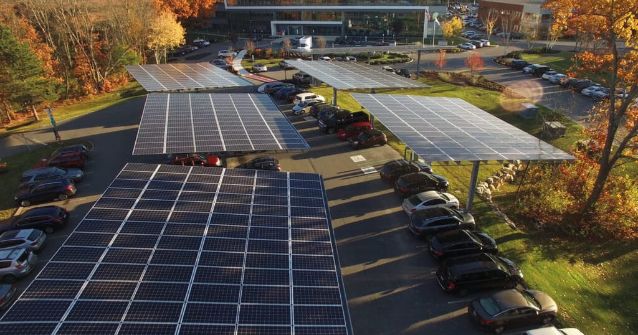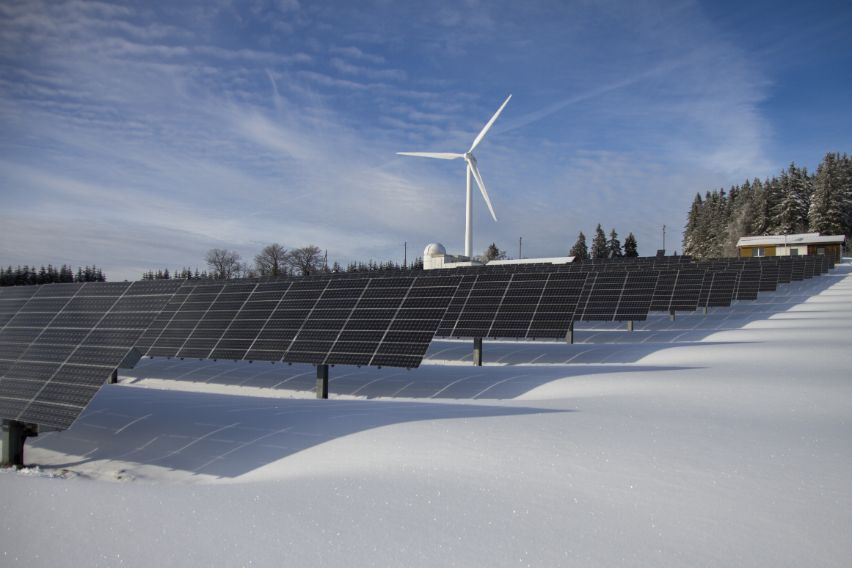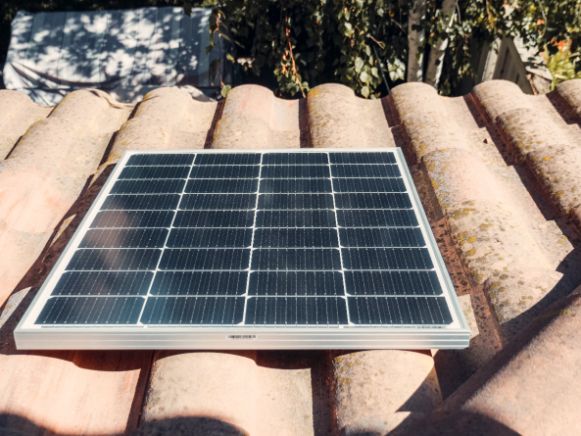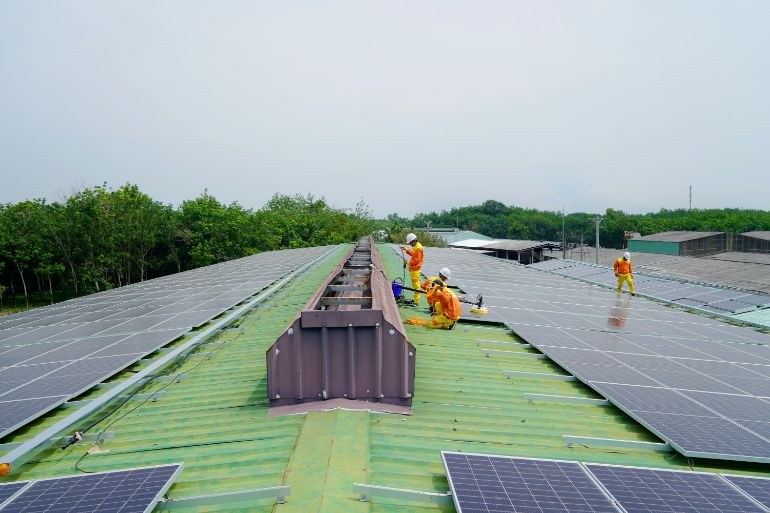Are you considering installing a solar generator in your home? Now that you’ve given it some thought, let’s examine how solar generators operate, consider the benefits and drawbacks of using one, and decide if it would be a wise investment for you.
Solar generators are a great way to have extra energy available, whether you need to keep your lights on when the power goes out or you want to charge your phone while you’re camping.
Solar generators are incredibly useful and adaptable machines. They capture the energy of the sun and turn it into energy that you can use in your home. They are an easy way to continue using your essential appliances and devices in the event of a power outage or other emergency.
Can a Solar Generator Power a Whole House?
The short answer is “yes,” but there are numerous factors to consider. Not all solar power systems can generate enough electricity for whole-house systems. You should instead think about the appliance you want to use as a home backup system and how you want to use it when there is a power outage.
To start, you must figure out how much energy your home typically uses. To make sure a solar generator has enough power to keep your home running when you need it, you must consider this before buying one. If you purchase a solar generator that doesn’t generate enough power, it might be a waste of money and even put you in danger in an emergency.
You should also think about how much energy your solar generator needs to produce. If you frequently lose power, you might want to consider buying a strong generator to keep everything in your house running even when you’re not connected.
Although a whole-home system has a high energy requirement, it is not impossible to implement. However, if you don’t experience power outages frequently, you might only need a short-term generator to power your essentials. Your solar generator’s specifications will be significantly altered by that.

Think about what you will need most during an emergency rather than how much energy your home as a whole produces. A thorough emergency plan will give you more precision and clarity when selecting your first solar generator. Perhaps you won’t need anything that can power your entire house. Sometimes all you need is a machine to keep the essentials running.
What is a Solar Generator?
A solar power generator technically refers to any device that uses solar energy. However, the term “solar generator” most commonly refers to a portable power station that generates electricity from solar panels rather than fossil fuels.
A portable solar generator collects energy from the sun using solar panels, then stores it in a battery for later use. For RV camping, boating, and as a backup power source in the event of a grid power outage, solar generators are typically used.
How Do Solar Generators Work?
Solar generators have four major components:
- Portable solar panels
- A solar charge controller
- A solar battery
- An inverter
Direct current (DC) electricity is produced by the solar panels and then routed through the charge controller. The battery is where the solar energy is stored for later use, and the charge controller controls the voltage of the electricity going into it. Currently, lithium-ion batteries make up the majority of solar generator sales.
When the battery’s energy needs to be used, the inverter transforms the electricity into alternating current power, or AC power, which is what the majority of appliances and devices use.
In order to allow you to charge several devices at once, solar generators frequently have USB ports, AC outlets, and 12-volt carports.
Advantages of Solar Generators
Free Fuel from the Sun
You must constantly buy fuel if you use a traditional gas-powered generator. There are no fuel costs when using a solar generator. Put your solar panel in place, then take advantage of the free sunshine!
Clean Renewable Energy
Solar power generators only use green, renewable energy. This means that in addition to not having to worry about the price of fossil fuels to run your generator, you also won’t have to worry about the environmental effects of using gasoline.
When they generate and store energy, solar generators don’t emit any pollutants. With clean energy supplying your camping or boating trip, you can relax.
Quiet and Low Maintenance

Solar generators’ quiet operation is yet another fantastic feature. Solar generators also have no moving parts, in contrast to gas generators. The noise they make while running is greatly diminished as a result.
Additionally, the absence of moving parts reduces the possibility of solar generator parts breaking. When compared to a gas generator, this significantly lowers the amount of maintenance needed for a solar generator.
Disadvantages of Solar Generators
High Upfront Costs
The upfront cost of solar generators is significantly higher than that of conventional gas generators. A gas generator typically costs around $1,000. The typical price of a solar generator is $2,000.00.
Solar generators, on the other hand, cost much less to operate. Therefore, you’ll spend less over the course of a solar generator.
Slow Recharging
Batteries for solar generators can only be recharged when the sun is shining. The solar panels take some time to fully charge the battery, even then. Most mid-sized solar generator batteries would require more than 9 hours to fully charge using a solar panel with a 100-watt power output.
Fossil fuel-powered generators can be refueled whenever you need them, so you never have to worry about the time of day or the weather when you need more power.
Limited Power Supply
The capacity of the generator will also be restricted by the size of the solar generator battery. You can’t likely power your entire house with a solar generator. However, it has the ability to temporarily power small appliances as well as charge phones and laptops.
Since gas generators can be filled at any time, there are fewer restrictions on what and how long they can power.
How Much Solar Generator Power Do You Need?
The truth is that a single solar generator or power station is insufficient to power a home, despite what you may have read. We’ll explain why you need between five and seven solar generators to power an entire home.
877 kwh are used by the typical home each month. This amounts to 30, or 10,649-kilowatt hours, in a year. 30 kilowatts is 30,000 watts. The largest commercially available solar generators, such as the Bluetti AC200P, have a 2000-watt capacity. 2000 watts can power a large number of appliances, but that is hardly enough to run a standard air conditioner, which needs 1800 watts to operate.
Your energy usage will be reduced by a mini-AC unit, especially if you also use a small fridge or other camping essentials. You should determine how many solar generators are required in your situation because everyone has different needs. Determine your intended use for the solar generator before you purchase it. These are some suggestions.
- 2000W to 4000W; RVs, small to medium size homes with only essential appliances running
- 5000W to 7500W: for emergency backup power in a large house
- 8000W to 10000W: run most household appliances
Do not be concerned if you can only find a 2000W solar generator. When the system has the required amount of energy, you can add more batteries to it. Or, as was already mentioned, use solar panels to generate additional power. For instance, you could pair a Mighty Max 500ah 24V AGM Battery with a 2000-watt solar generator.
Once more, these are estimates based on the typical household watt usage. Use the steps below to determine the size of the solar generator needed because yours may be entirely different.
What Size Solar Generator Do You Need to Power Your House?
A simple generalization to remember is that a solar generator can produce more power the bigger it is. Wattage is the most common unit of measurement for power generators. The more they can power at any given time, the higher the wattage. You need to be aware of the wattage requirements for your essential appliances before making an informed purchase.

A product’s peak power and continuous power should also be considered in addition to its capacity. When a generator first starts up, it can produce its peak power. A generator’s capacity to operate continuously over time is measured in watts.
You must consider both when getting your first generator so that it can produce enough power to power a device or appliance and continue to do so.
How Long Can a Solar Generator Keep Running?
In operation, solar power plants are similar to conventional generators. As soon as the power is cut, they start to move. As long as there is a sufficient power supply, a solar generator can continue to operate. It is theoretically possible for it to continue running forever.
Take the Titan generator, for instance, which has a 3000W pure sine wave inverter and the ability to produce up to 2200wh of continuous power. It can accept up to 2000W of power from two solar panel inputs.
Connect your solar panels to your generator if they have a 2000-watt output to ensure a constant supply of power. Although there will be power, the panels probably won’t be able to recharge the generator quickly enough. To maintain power, you can also recharge the Titan using an AC or DC outlet or a 24 V battery.
For added power, you can also affix multiple batteries to the generator. Due to its superior performance, the majority of these generators only accept lithium-ion batteries. You can stack an unlimited number of batteries in some solar power plants. In case you want to use a solar generator to power an RV, bear this in mind.
These numbers can be doubled for a 2000W solar power station. The generator will be able to power more devices if you add batteries. These electronics won’t use as much power since you’re not likely to use them in this manner either. Other appliances can be powered by the available power.
A 2000W solar generator can:
- Charge a laptop for 40 hours
- Run several kitchen appliances
- Charge a smartphone for 300 hours
- Power a 50″ TV for 50 hours
- Power a refrigerator for 30 hours

Ultimately, as long as there is a power source, a solar generator can run continuously. True, a lot of power is needed for this setup, but it is possible. it comes down to how much of your house or You want your RV to be solar-powered.
FAQs
What Can You Run With a Solar Generator?
Due to their clean and renewable energy source, solar generators are becoming a more and more common choice for portable power. Solar generators can power small appliances like lights and phone chargers or larger devices like TVs and refrigerators.
Is It Worth Getting a Solar Generator?
While you may not need a solar generator, they can be useful as a backup power source, especially if you live in an area prone to power outages. You don’t need to worry about expensive or limited fuel because it doesn’t need it. You can always run your house on electricity, even without fuel.
Conclusion: Is It Worth Buying a Solar Generator?
About sums it up there! Everything you need to know about solar power and how it can be used to power your home. Solar generators are mobile power plants that generate electricity using solar energy rather than fossil fuels.
Although challenging, it is possible to run a home on solar power. It depends on your specific needs and the percentage of the property you want to run on solar power. Once the planning is complete, setting up the generator system and using your appliances is not too difficult.
